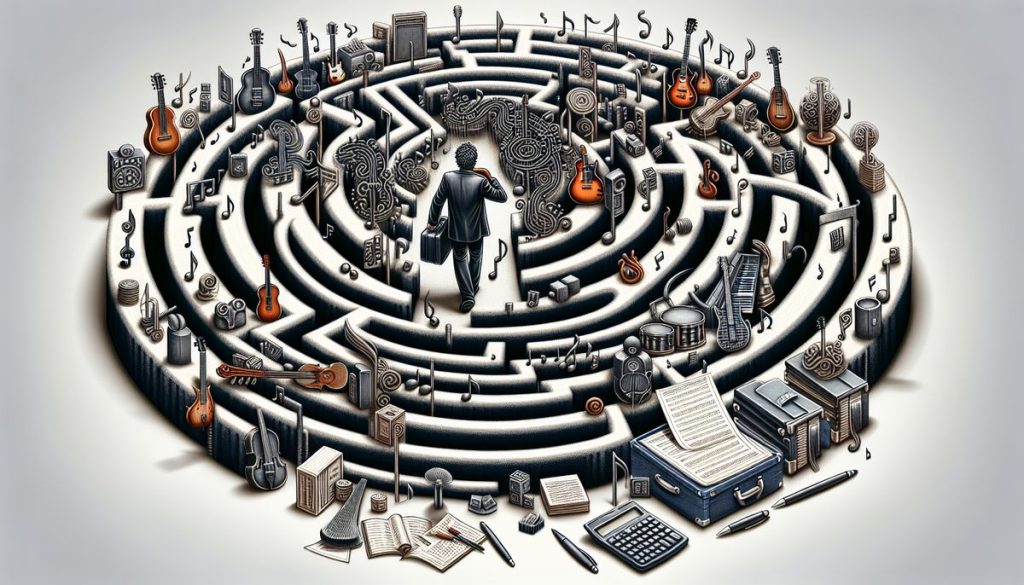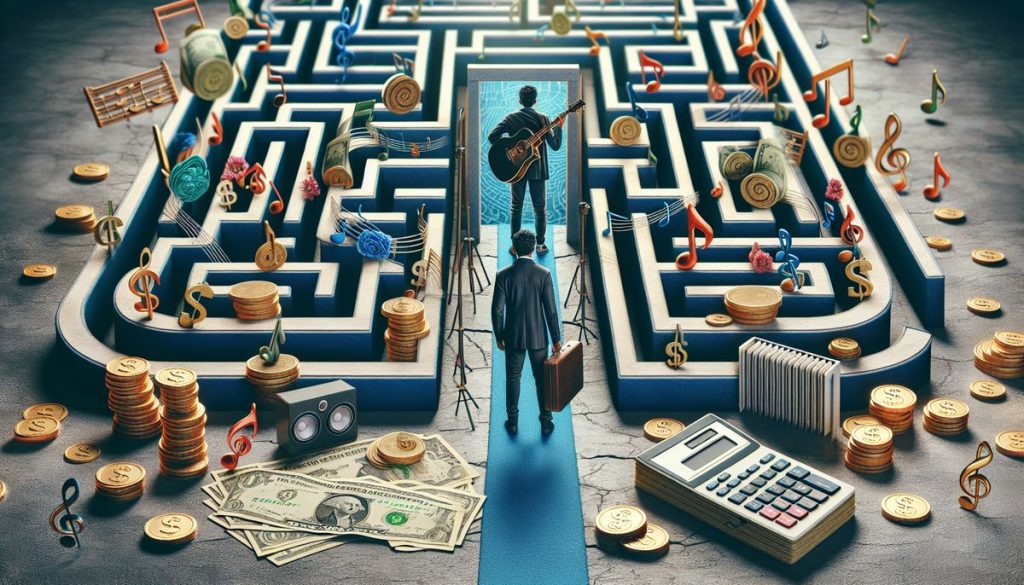Navigating Royalties and Rights: Essential Tips for Today’s Emerging Music Artists
Written by DJ Prodigee on Tue Apr, 2024
In the ever-evolving landscape of the music industry, understanding the intricacies of royalties and rights is crucial for emerging artists. This article provides essential tips for navigating the complex world of music copyrights, royalties, contracts, and financial management. Whether you’re figuring out how to maximize your earnings from streaming services or learning the ropes of licensing your music, these insights will help you protect your work and ensure you’re fairly compensated.
Key Takeaways
- Grasping the fundamentals of music copyrights and royalties is imperative for protecting your intellectual property and ensuring fair compensation.
- Financial savvy is essential for artists; budget wisely for production costs and understand the tax implications of your royalty income.
- Streaming services like Spotify and Apple Music offer unique challenges and opportunities; learn how to navigate these platforms to maximize your earnings.
- Session musicians must be aware of their rights and standard rates, and understand the importance of contracts to safeguard their interests.
- Licensing your music can be a significant source of income; comprehend the basics and take steps to get your music licensed for various uses.
The Legal Score: Decoding Copyrights and Royalties
Understanding the Basics of Music Copyrights
Alright, future rockstars and pop divas, let’s get down to the nitty-gritty of music copyrights. Think of it as the secret sauce that keeps your tunes from being the free lunch special on the internet. Copyrighting your music is like building a fortress around your castle of chords. It’s the first step in making sure that no sneaky goblins (or, you know, other artists and companies) can use your hard work without tossing some coin your way.
Now, let’s talk licenses, because they’re the VIP passes to the music industry party. There are more types of licenses than there are guitar strings, and each one lets you strum up cash in different ways. Here’s a quick breakdown:
- Mechanical Licenses: These bad boys let others reproduce your song for CDs, vinyl, and yes, even those quaint little MP3s.
- Performance Licenses: Get paid when your song is played live, on the radio, or even in an elevator in an obscure shopping mall.
- Sync Licenses: The golden ticket for when your song gets to cozy up to a movie, TV show, or commercial.
Remember, amigos, without the proper licenses, you’re just serenading the stars for free. And while that’s poetic and all, it won’t pay for your next set of guitar strings.
So, whether you’re a solo act or part of a band that’s got more members than you can count on your fingers, understanding these royalties and rights is crucial. It’s the difference between singing for your supper or feasting like the rock royalty you aim to be. And hey, if all this legal mumbo-jumbo makes your head spin, consider collaborating with a music lawyer. They’re like the Gandalf to your Frodo in the treacherous world of music contracts.
Publishing Rights and Royalties: The Artist’s Payday
Let’s face it, understanding the world of music royalties is about as easy as explaining why cats hate water. But fear not, emerging rockstars and shower singers, for we’re about to dive into the cash pool of publishing rights and royalties. Your music is more than just a catchy tune; it’s a potential goldmine!
So, what’s the deal with publishing royalties? These are the bucks that jingle in your pocket every time someone covers your song at a wedding or your track gets played in an elevator in some far-off land. It’s the money owed to the owner(s) and/or songwriter(s) of a composition. And yes, it’s different from recording royalties, which is the dough you get when your actual recording is played.
Here’s a quick rundown on how the moolah is split:
- Performance Royalties: When your song is performed live or broadcasted.
- Mechanical Royalties: When your song is reproduced, like in CDs or downloads.
- Synchronization Royalties: When your song is used in film, TV, or ads.
Remember, if you’re not signed up with a PRO (Performance Rights Organization), you might as well be throwing your money into a wishing well. These guys are the middlemen who make sure your coins clink all the way to your bank account.
And let’s not forget, the split between royalties can be more lopsided than a seesaw with an elephant on one end. It’s often skewed towards the record label, leaving songwriters to wonder if they’re just in it for the free snacks at the studio. But don’t despair, because with a little know-how and a good music lawyer, you can negotiate your way to a fairer share.
Navigating Contracts: Why You Might Need a Music Lawyer
Let’s face it, legal documents are about as fun to read as the phone book (remember those?). But when it comes to your music career, skimming the fine print just won’t cut it. Contracts are like the secret sauce to your success—mess them up, and you might as well kiss your hard-earned royalties goodbye.
Here’s the deal: Music contracts are a labyrinth of legalese that can make even the most seasoned crossword enthusiast sweat. That’s where a music lawyer struts in, guitar case in hand, ready to rock out… I mean, read out those tricky clauses. They’re the unsung heroes who ensure you’re not signing away your firstborn to a sneaky record label.
- The Good: A lawyer can spot a bad deal from a mile away.
- The Bad: They don’t work for high-fives and thank you notes.
- The Ugly: Without one, you might accidentally agree to perform at the CEO’s nephew’s bar mitzvah.
Remember, a music lawyer doesn’t just translate the gibberish; they negotiate terms that could make or break your bank. So, unless you’ve got a secret degree in contract law, investing in a good music lawyer might just be the smartest move you make—aside from that killer key change in your latest single, of course.
Show Me the Money: Financial Management for Musicians
Budgeting Beats: Planning for Productions, Tours, and Marketing
Let’s face it, your piggy bank isn’t going to survive the rockstar lifestyle without some serious budgeting skills. Mastering the art of financial juggling is as crucial as that killer riff you just wrote. You’ve got to plan for everything from guitar strings to gas for the tour van. And remember, those flashy stage lights aren’t going to pay for themselves!
- Plan your budget: Start with the big picture and break it down. How much do you need for recording, touring, and marketing? Don’t forget the hidden gems like equipment maintenance and emergency guitar picks.
- Explore funding options: Look into grants, crowdfunding, and maybe even that rich uncle who always wanted to be a rockstar.
- Get a grip on contracts and royalties: Know what you’re signing and what you’re earning. Partner with a financial advisor if numbers aren’t your jam.
- Taxes, ugh: They’re as inevitable as a bass player’s solo. Understand your cash flow, expenses, and savings to keep the taxman at bay.
Pro tip: Keep a separate bank account for your band’s expenses. It’s easier to track and, let’s be honest, it feels pretty professional too.
Royalties and Taxes: Keeping Your Finances in Tune
Let’s face it, the only thing more confusing than trying to understand the plot of a Christopher Nolan movie is figuring out music royalties and taxes. But fear not, my fellow melody makers, for I bring you the gospel of financial harmony! First things first, get your ducks in a row with a solid budget. This isn’t just about counting the cash from your latest gig; it’s about planning for the long haul.
Tax advice is like a love song from the IRS: complicated, necessary, and often unsolicited. But you’ve got to tune into it. Here’s a quick rundown of what you should be serenading in your financial setlist:
- Tax Returns and Enquiries: Like a yearly performance review but with more paperwork.
- Record Keeping for Tax Purposes: Your financial history, better kept than your ex’s texts.
- Claiming Expenses: From guitar strings to gas for the tour van, keep those receipts!
- Saving Tax by Investing: Make your money work for you, not just your music.
Remember, deductible expenses are the unsung heroes of your tax return. They’re like the backup singers to your lead vocal—they make everything sound sweeter.
And when it comes to music royalties, think of them as your financial fan club. The more you understand them, the more they’ll cheer for your bank account. So, dive into the different types of royalties and learn how to maximize them. After all, every artist deserves their payday to be as grand as their finale!
Maximizing Your Music Moolah: Tips to Increase Royalty Income
Let’s face it, your tunes are your ticket to the big bucks, but only if you play your cards right. Getting your music out there is just the start; it’s the savvy moves you make afterwards that fill your pockets. MizFitz Radio spills the beans on how to crank up those royalty checks. They say it’s all about standing out in the crowd, creating those earworms that climb the charts, and riding the wave of stardom without wiping out.
Here’s a quick hit list to keep your royalty game strong:
- Leverage streaming platforms like Spotify and Apple Music to the max.
- Don’t just sit there; get your music licensed for TV, films, and ads.
- Sync deals are your friend; they’re like winning the lottery but with better odds.
Remember, it’s not just about making music; it’s about making smart moves. Think of royalties as a game of chess, and you’re aiming to checkmate.
And hey, if you’re feeling lost in the sea of legal jargon and contract mumbo-jumbo, consider hooking up with a music lawyer. They’re like the GPS for navigating the rocky roads of the music biz.
The Streaming Struggle: Unlocking Online Music Royalties
The Spotify Saga: Understanding Streaming Royalties
So, you’ve been jamming out, creating tunes that even your grandma can’t help but groove to, and now you’re ready to dive into the Spotify ocean. But wait, before you take the plunge, let’s talk about the treasure chest of streaming royalties. Understanding how these royalties are split is crucial for any artist looking to make a splash on the platform.
Spotify’s royalty system might seem like it’s written in the ancient language of Elvish, but here’s the gist: the more your tracks are played, the more coin you pocket. However, don’t expect to buy that gold-plated guitar just yet. The payout per stream is more like finding loose change in your couch cushions than hitting the jackpot.
- Publishing Royalties: These are the shiny coins owed to the songwriters and owners of the composition.
- Recording Royalties: This is the cash for the performers and producers of the track.
Remember, it’s not just about the number of streams; factors like your track’s popularity and the total streaming hours on the platform also play a big role in filling your piggy bank.
And hey, did you hear about Spotify’s latest move? They’ve decided that tracks with less than 1,000 streams a year are just not cool enough for royalties. Instead, they’re giving that dough to the big fish in the pond. Talk about survival of the fittest, or should I say, the most streamed!
Apple Music and Others: Diversifying Your Digital Dollars
Let’s face it, putting all your eggs in one streaming basket is like trying to play a guitar solo with a trombone – it just doesn’t work. Diversifying your income streams is the name of the game, and it’s not just about juggling Spotify and Apple Music. There’s a whole world of Digital Service Providers (DSPs) out there, from Deezer to Tidal, each with their own quirky ways of calculating your cut of the pie.
Remember, it’s not just about quantity, but the quality of your streams. A thousand passionate fans on a niche platform might be worth more than a million passive listeners elsewhere.
Here’s a quick rundown of what you might expect from these digital dollar dispensaries:
- Publishing Royalties: The bread and butter for songwriters. These royalties are paid out by publishers or collecting societies, and they’re all about the composition.
- Recording Royalties: This is where the performers get their share. It’s the money owed for the actual recordings, and it’s usually collected by record labels or distribution companies.
And hey, did you hear about Spotify’s new policy? They’re not paying out for tunes with less than 1,000 streams a year. That’s like telling a drummer they only get paid if they hit the cymbals hard enough. But don’t sweat it too much; there are plenty of other platforms where your music can shine, and your wallet can bulk up.
Boosting Your Bankroll: Strategies to Enhance Streaming Income
Let’s face it, your streaming income might currently be looking sadder than a one-hit wonder’s comeback tour. But fear not! With a few tweaks, you can turn those digital dimes into dollars. Diversify like a musical octopus—stretch those tentacles into live gigs, merch, and maybe even some YouTube shenanigans. Remember, variety is the spice of life, and it’s also the secret sauce to a fatter wallet.
Consistency is key, folks. Whether you’re dropping beats or educational tweets, keep your online presence as regular as grandma’s fiber intake. And speaking of online, let’s talk YouTube. Maximizing your channel isn’t just about viral cat videos—though, let’s be honest, those help. It’s about brand partnerships, quality content, and maybe even some cover songs that get people clicking faster than a teenager texting on prom night.
Now, let’s get down to the nitty-gritty of streaming royalties. Most digital service providers (DSPs) have a royalty pool that’s about as easy to understand as quantum physics. But here’s the scoop: the more your tracks are played, the bigger slice of the pie you get. So, promote like you’re running for president of Popville, and watch those streams—and income—soar.
Here’s a little cheat sheet to keep your strategies straight:
- Diversify your income streams (live shows, merch, teaching)
- Maintain a consistent online presence
- Partner with brands and focus on quality content on platforms like YouTube
- Understand the DSPs’ royalty pool system to maximize earnings
Remember, in the music biz, it’s not just about the notes you play—it’s about the moves you make. So, let’s get strategic and turn that stream into a river!
Gigging and Jigging: The Life of a Recording Session Musician
Session Success: Navigating the World of Recording Gigs
So you’ve decided to dive into the studio sea and become a session musician? Bravo! But before you start strumming or tickling the ivories for cash, let’s get a few things straight.
First off, know your worth! Here’s a quick rundown of what you might expect:
- Demo sessions: You’re the backbone, but don’t expect fame.
- Commercial releases: Better pay, better exposure.
- Film/TV gigs: Jackpot! But as rare as a drummer on time.
Remember, it’s not just about showing up and playing a few tunes. You’ve got to be a mix of a ninja (silent and deadly… with your instrument, that is) and a diplomat (because egos, they are a-plenty).
And hey, don’t forget to keep those ears open and eyes peeled for the fine print in contracts. It’s like finding a left-handed piccolo—uncommon, but a real game-changer when you do.
Lastly, always bring your A-game to the studio. You never know when a simple gig might turn into a regular collab with someone who’s got connections deeper than a bass drop. Rock on!
Contract Clauses and Studio Shenanigans: Know Your Rights
When you’re a session musician, you’re not just jamming for fun—you’re in the biz of beats and bucks. Always read the fine print on any gig contract, because that’s where the sneaky stuff hides. Think of it like a treasure map, where ‘X’ marks the spot where they try to stiff you on royalties.
Here’s a quick rundown of the essentials you should look for in a contract:
- Dough Details: How much and when you get paid
- Replay Rights: What happens when your sick solo gets replayed
- Cancellation Clauses: Because sometimes gigs go poof
Remember, contracts are like drum solos: they need a tight rhythm and no room for error. If the legalese is thicker than a bassline drop, get a music lawyer to decode that jargon jam.
Pro Tip: Negotiate your rates like a rockstar. Don’t settle for background vocalist pay when you’re hitting lead guitarist notes.
Remote Recording Rundown: Rate Guidelines and Etiquette
So, you’re ready to turn your closet into a makeshift recording booth and make some dough from the comfort of your pajamas? Bold move, my friend. But before you hit record, let’s talk turkey—or rather, rates and etiquette.
First off, don’t sell yourself short. Your skills are worth more than a couple of likes on SoundCloud. Here’s a quick rundown on typical rate ranges:
- Demo recordings: $100 – $300 per song
- Commercial releases: $300 – $500+ per song
- Full album projects: Negotiable (bring your poker face)
Remember, these are ballpark figures. Your mileage may vary based on your rep, skills, and whether you can make a ukulele sound like a Stradivarius.
Now, etiquette. It’s not just about saying ‘please’ and ‘thank you.’ It’s about clear communication, punctuality, and not sending files that sound like they were recorded during a hurricane. Be professional, be courteous, and for the love of auto-tune, make sure your tracks are clean and properly labeled.
Lastly, always get the deets in writing. A virtual handshake is as good as an I.O.U. in Monopoly money. Contracts are your besties here—they keep things smoother than a jazz solo on a Sunday morning.
Composing Cash: Licensing Music and Cashing In
Licensing Lowdown: A Beginner’s Guide to Music Rights
Alright, you musical mavericks, let’s dive into the licensing labyrinth where the Minotaur is a metaphor for the complex world of music rights. Navigating this maze is key to monetizing your melodies without getting lost in the legalities or, worse, getting gobbled up by greedy industry giants.
First things first, you gotta copyright your tunes. Think of it as calling dibs on your music before anyone else can claim your killer chorus as their own. Once you’ve got that sorted, it’s time to understand the different licenses out there. We’re talking mechanical, public performance, and synchronization licenses, among others. It’s like picking the right tool for the job—except the job is getting paid every time someone hits play.
Remember, joining a Performing Rights Organization (PRO) is like having a backstage pass to the royalties party. These folks collect the cash on your behalf, so you can focus on what you do best: creating more chart-topping hits.
Here’s a quick breakdown of the types of licenses you’ll encounter on your quest for music monetization:
- Mechanical Licenses: For reproducing and distributing your music.
- Public Performance Licenses: For when your jam gets played in public spaces.
- Synchronization Licenses: For syncing your music with visual media like films.
And there you have it, a crash course in music licensing. Now go forth and conquer, and don’t forget to send me a postcard from the top of the charts!
Royalty Rundown: Understanding Different Types of Music Income
Let’s dive into the wallet of the music world and see where the cash comes from, shall we? Music Royalties 101: How Artists Make Money from Music—sounds like a class you’d actually want to attend, right? Well, buckle up, because we’re about to break down the main types of music royalties: mechanical, performance, micro-sync, and print. These are the bread and butter for your tunes, and getting a grip on them is like finding the secret menu at a burger joint.
Mechanical royalties? They’re like your reliable old pal, always showing up when someone presses play on a physical copy or a download. Performance royalties are the social butterflies—flitting about every time your track is played in public, whether it’s on the radio, at a club, or even an elevator. Micro-sync royalties might sound tiny, but they pack a punch when your music is used in those viral TikTok dances or YouTube vlogs. And let’s not forget print royalties, the old-school cool cats, earning you some coin whenever your sheet music is sold.
Now, let’s not kid ourselves, the royalty pool can be as murky as a swamp in a horror movie. The way that streaming services divvy up the dough from subscription fees can leave you scratching your head—and not just to the beat of your latest track. If someone’s jamming only to their friend’s garage band but paying the same subscription fee as the next person, the majority of their cash is going to artists they’ve never even heard of. Talk about a plot twist!
So, what’s the takeaway? Understanding the different types of royalties is crucial, but so is knowing how they’re split. It’s like knowing the recipe to your grandma’s secret sauce—without it, you’re just eating plain spaghetti.
Remember, the split between publishing and recording royalties is often skewed more towards the record label, which can leave songwriters feeling like they’ve been left with the crumbs of the pie. It’s a tough cookie to crack, but hey, that’s showbiz, baby!
Pitching Your Tunes: How to Get Your Music Licensed
So you’ve got tunes that could make a statue tap its toes, and now you’re ready to license those bad boys. First things first: make sure your music is copyrighted. Without that, you’re just throwing your pearls to the pigs, my friend.
Next up, understand the marketplace. It’s like knowing which pond to fish in. You wouldn’t try to catch a marlin in a kiddie pool, right? Same goes for music licensing—know your genre, know your audience, and pitch accordingly.
Now, let’s talk about the choreography of sync licensing. It’s a dance, and you’re the lead. Step one: Craft quality music. Step two: Understand the market. Step three: Start pitching!
Here’s a quick rundown of steps to get your music out there:
- Craft quality music that resonates with emotion and versatility.
- Understand the marketplace and where your music fits best.
- Network like your career depends on it (because it does).
- Pitch your music to the right people, at the right time, in the right way.
Remember, music licensing isn’t just about making bank—it’s about strategic growth and protecting your creative babies. So put on your game face, and let’s get those tunes working for you!
Rockin’ Out with Royalties: The Final Note
Alright, my fellow music maestros, we’ve jammed through the nitty-gritty of royalties and rights like a killer guitar solo. Remember, navigating this biz is like playing a never-ending encore – you gotta keep the crowd (and your bank account) cheering. So copyright your tunes, count those streaming pennies, and schmooze with the rights organizations. And hey, if it all gets too much, just imagine you’re headlining at ‘Legalpalooza’ – the most rockin’ legal conference ever. Keep strumming, keep humming, and most importantly, keep earning those royalties. Rock on!







